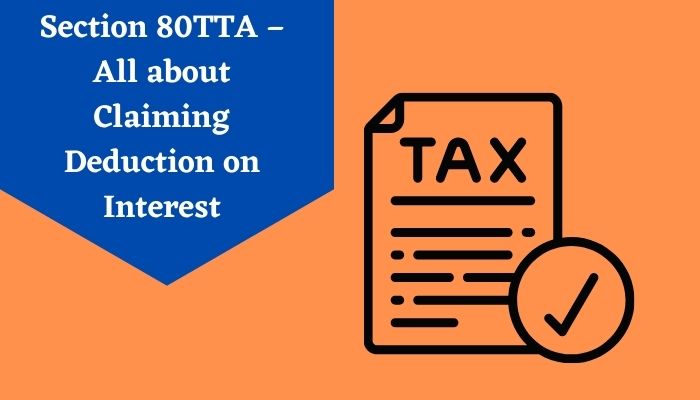Section 80TTA – All about Claiming Deduction on Interest
Nobody enjoys paying taxes but it is a necessary part of being a good citizen and is everybody’s responsibility. But what if we told you that you can now enjoy paying taxes? This sounds too good to be true.
However, we are here to tell you that it’s not. You can get several deductions on your taxes by becoming more familiar with Section 80TTA of the Income Tax Act. And we’ll help you with just that today!
What is Section 80TTA of the Income Tax Act?
Before you can learn how to avail of Section 80TTA deductions, it is important to learn about Section 80TTA of the Income Tax Act. This section provides a deduction for interest income. The deduction is available with a few limitations and restrictions.
It should be noted that when a taxpayer’s gross total income includes any income that is done through interest on deposits, then such type of income is classified as being tax-free. To be eligible for this deduction, the taxpayer must be an individual taxpayer, a Hindu Undivided Family (HUF), or a member of a Hindu Undivided Family.
Beyond this, the income that is being done through interest from a deposit must be from a savings account that fulfils the conditions that are mentioned below.
- A banking company that works according to the Banking Regulation Act, 1949 (10 of 1949)
- A cooperative society engaged in carrying on the business of banking
- A co-operative land mortgage bank
- A co-operative land development bank
- A post office under the Indian Post Office Act, 1898
It should also be noted that a taxpayer can claim tax exemption while computing his or her total income. The tax deductions are not available on the interest income from time deposits, which can be defined as a deposit that is repayable on the expiry of a fixed period along with a fixed interest rate.
There are also other cases under which tax deductions are not available. These cases are:
- Interest from fixed deposits
- Interest from recurring deposits
- Any other time deposits
Taxpayers must also be familiar with the fact that the maximum deduction allowed under Section 80TTA is INR 10,000 for a financial year. If the total amount of interest is less than INR 10,000, then the actuarial interest is exempt.
If the total interest earned is more than INR 10,000, then only a maximum of INR 10,000 is allowed as a tax exemption amount. For this to be valid, the assessee must consider his or her total interest from all the savings bank accounts.
Eligibility Criteria for Claiming Deductions Under Section 80TTA
There are eligibility criteria that one must fulfill if he or she wants to get deductions under Section 80TTA. These eligibility criteria are given below.
- The taxpayer must be an Indian resident
- One should be an individual taxpayer
- Members belonging to a Hindu Undivided Family (HUF)
- One is a non-resident Indian (NRIs) that owns an NRO savings account
- The taxpayer has savings accounts at institutions like banks, cooperative societies, or post offices
Apart from being familiar with the eligibility criteria, one should also be familiar with the cases under which a taxpayer cannot opt for deductions under Section 80TTA. These conditions are mentioned below.
- The interest is derived from a deposit in a savings account and the account is held by or on behalf of a firm, an association of persons, or a body of individuals
- No deductions will be allowed to any partner of the firm or any member of the association or any individual of the body. A deduction against the interest income is not calculated if the total income of these taxpayers is through any partner of the firm
- Senior citizens cannot claim deductions under Section 80TTA of the Income Tax Act
- A firm, BOI, or AOP cannot claim the interest deduction. Any partners or members who receive their income from these firms, BOI, or AOP cannot claim a deduction either
One should remember that if a senior citizen wants to claim a deduction, then he or she needs to do that through Section 80TTB.
How Can I Claim Section 80TTA Deduction While Filing an Income Tax Return?
To claim any deduction under Section 80TTA, one must first add the interest income under the head ‘Income from other sources as interest income. After that, the taxpayer needs to claim tax benefits under Section 80 deductions under Section 80TTA.
The Difference Between Section 80TTA and Section 80TTB
Many taxpayers get confused between the deductions claimed through Section 80TTA and Section 80TTB. Because of this, we are going to look at the difference between deductions claimed through Section 80TTA and Section 80TTB in this section. These differences are mentioned in the table that is given below.
|
Section 80TTA |
Section TTB |
|
Individual taxpayers and Hindu Undivided Family (HUF) members can claim deductions under this section |
Only senior citizens above the age of 60 years can claim deductions under this section |
|
One can claim deductions on the interest amount that is received on deposits with savings accounts only |
One can claim deductions on interest amount earned through deposits with a savings account, fixed deposit, term deposit, or recurring deposit |
| The exemption limit under Section 80TTA is applicable up to INR 10,000 per annum |
The exemption limit under Section 80TTB is applicable up to INR 50,000 per year |





























